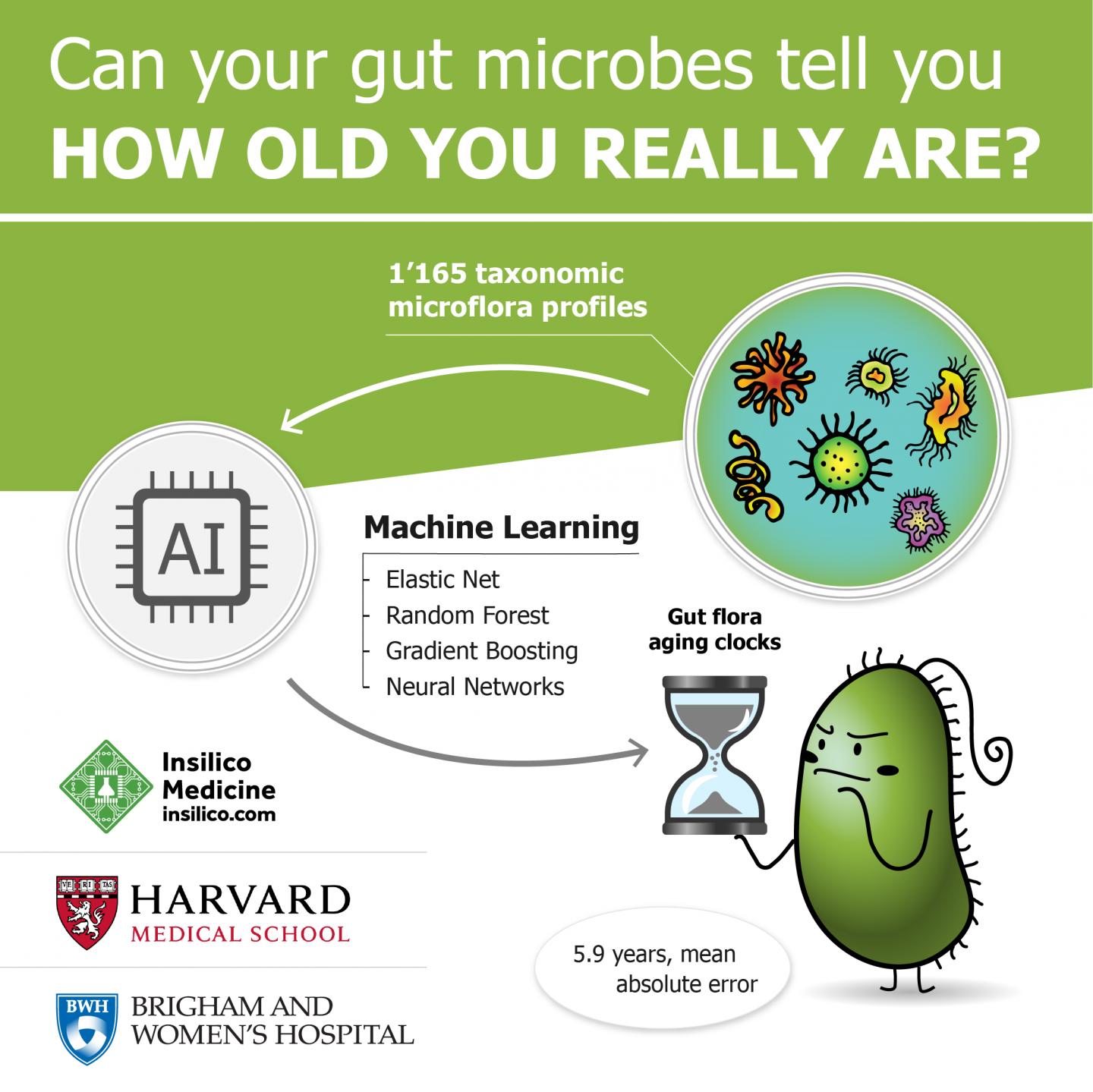
Credit: Insilico
Highlights:
- In 2018 scientists from Gladyshev lab specializing in aging research started a collaboration with Insilico Medicine resulting in a widely-publicized proof of concept microbiomic aging clock ;
The clock has been validated on multiple independent data sets;
The clock was shown to be biologically-relevant and used to demonstrate that diabetic patients look older than their chronological age;
The study was published in iScience and is expected to be used in new data analysis tools for COVID-19 and longevity research;
June 11th, 2020 – Recent advances in deep learning have allowed AI algorithms to outperform humans in image, text, and voice recognition. One particular use for AI in biology is deep aging clocks. Deep aging clocks are trained on large samples to predict human biological age using different data types, such as: pictures, videos, voice, blood biochemistry, gene and protein expression, and MRI. In a study recently published in iScience, Harvard and Insilico Medicine scientists used thousands of whole genome sequencing samples from gut bacteria to develop and validate a new deep microbiomic aging clock. This new tool indicates that the age of the host is a significant contributor to the gut community dynamics.
Over the last decade human gut microbiome studies have produced multiple surprising results. The bacteria in our gut are now known to be major contributors to the immune function, brain development and activity, central metabolism, obesity pathogenesis and many other processes. The growing realization of the role microbiota plays in human health makes it essential to understand what factors shape gut communities and how to manipulate them.
Such factors include the mode of birth, diet, physical activity and age. The effect age elicits on microflora dynamics is much better understood for the early stages of life. During the first year of life all people are much more similar in terms of diet and behaviour, compared to adults. Consequently, their gut flora goes through clearly defined stages. But upon transitioning to adulthood, multiple confounders such as diet, tobacco and alcohol consumption, and level of physical activity make individual microfloras extremely diverse. The NIH Human Microbiome Project has shown that there is no core community in adult guts, although the various combinations of microbial species tend to have similar functions and metabolic capabilities.
Multiple studies have identified some age-related trends in gut microflora. However, the findings usually have unclear general applicability due to localized sampling. In a joint project between Insilico Medicine and the laboratory of Vadim Gladyshev at Brigham and Women’s Hospital and Harvard Medical School, the data from 13 public studies on human gut microbiome were aggregated to explore the possibility of developing an aging clock based on the microflora relative abundance profiles.
The initial attempt to predict chronological age based on gut community species composition was published in BioRxiv in December 2018. Since then the team further improved their approach and recently published their results in the iScience journal. More than 1100 species-level microflora compositions were used to train a Deep Neural Network in a cross-validated manner. The resulting ensemble predicts hosts’ age in an independent data set collection with a mean error of 5.9-6.8 years.
The published intestinal age predictor proves that there are microflora succession patterns associated with age progression in the adult. The described workflow can be used to recreate similar models with data from other platforms and explore the effect of specific bacterial taxa on the course of human aging in a more controlled setting. The authors also suggest the ways to identify the microbes with potential to accelerate or slow down aging.
“We are happy to collaborate with the Gladyshev lab on this new microbiomic aging clock, which is the first of its kind. The development of this clock was a long and tedious journey as we originally thought that it would be impossible to build and after the demonstration of the first proof of concept, it took two years to refine and validate. We hope that the demonstrated approach will be used for COVID-19 research and later for longevity research for tracking the effects of different interventions and foods on the predicted intestinal age”, said Alex Zhavoronkov, PhD, CEO of Insilico Medicine.
The reported aging clock can be accessed at aging.AI. Insilico Medicine aims to continue developing microbiomic tools and is planning to release COVIDOMIC — a tool for exploring variables with an effect on the COVID-19 infection outcome, including those derived from patients’ respiratory microbiome.
###
Read the original research paper here:
https:/
About Insilico Medicine
Since 2014 Insilico Medicine is focusing on generative models, reinforcement learning (RL), and other modern machine learning techniques for the generation of new molecular structures with the specified parameters, generation of synthetic biological data, target identification, and prediction of clinical trials outcomes. Recently, Insilico Medicine secured $37 million in series B funding. Since its inception, Insilico Medicine raised over $52 million, published over 80 peer-reviewed papers, applied for over 25 patents, and received multiple industry awards. Website http://insilico.
For further information, images or interviews, please contact: [email protected].
Media Contact
Klug Gehilfe
[email protected]





